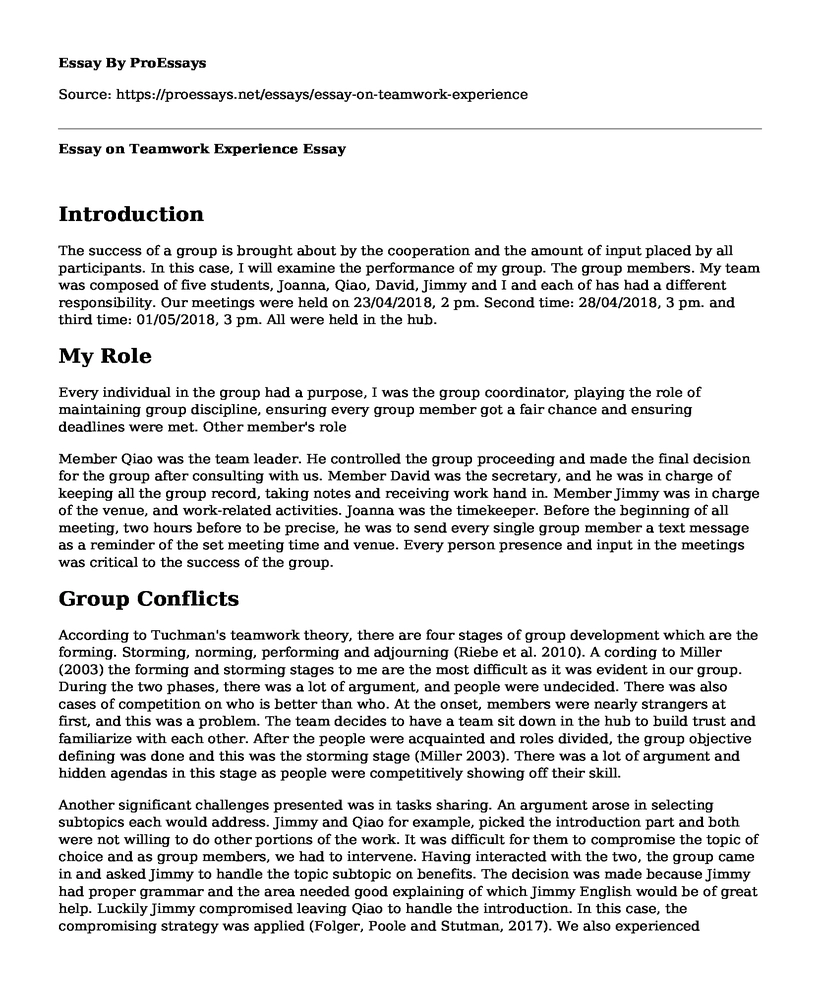Introduction
The success of a group is brought about by the cooperation and the amount of input placed by all participants. In this case, I will examine the performance of my group. The group members. My team was composed of five students, Joanna, Qiao, David, Jimmy and I and each of has had a different responsibility. Our meetings were held on 23/04/2018, 2 pm. Second time: 28/04/2018, 3 pm. and third time: 01/05/2018, 3 pm. All were held in the hub.
My Role
Every individual in the group had a purpose, I was the group coordinator, playing the role of maintaining group discipline, ensuring every group member got a fair chance and ensuring deadlines were met. Other member's role
Member Qiao was the team leader. He controlled the group proceeding and made the final decision for the group after consulting with us. Member David was the secretary, and he was in charge of keeping all the group record, taking notes and receiving work hand in. Member Jimmy was in charge of the venue, and work-related activities. Joanna was the timekeeper. Before the beginning of all meeting, two hours before to be precise, he was to send every single group member a text message as a reminder of the set meeting time and venue. Every person presence and input in the meetings was critical to the success of the group.
Group Conflicts
According to Tuchman's teamwork theory, there are four stages of group development which are the forming. Storming, norming, performing and adjourning (Riebe et al. 2010). A cording to Miller (2003) the forming and storming stages to me are the most difficult as it was evident in our group. During the two phases, there was a lot of argument, and people were undecided. There was also cases of competition on who is better than who. At the onset, members were nearly strangers at first, and this was a problem. The team decides to have a team sit down in the hub to build trust and familiarize with each other. After the people were acquainted and roles divided, the group objective defining was done and this was the storming stage (Miller 2003). There was a lot of argument and hidden agendas in this stage as people were competitively showing off their skill.
Another significant challenges presented was in tasks sharing. An argument arose in selecting subtopics each would address. Jimmy and Qiao for example, picked the introduction part and both were not willing to do other portions of the work. It was difficult for them to compromise the topic of choice and as group members, we had to intervene. Having interacted with the two, the group came in and asked Jimmy to handle the topic subtopic on benefits. The decision was made because Jimmy had proper grammar and the area needed good explaining of which Jimmy English would be of great help. Luckily Jimmy compromised leaving Qiao to handle the introduction. In this case, the compromising strategy was applied (Folger, Poole and Stutman, 2017). We also experienced challenges in meeting the deadline as expected. David in one of the meeting failed to show up due to unknown problems. This was conflicting with our schedule. However, since we had a deadline to meet and four of us were present us decided to extend the meeting for two more hours to handle the task David was expected to do for that day. This conflict was solved through accommodating strategy whereby we did put ourselves in his position, and rather than complaining; we decided to add more hours to our schedule to do his task (Folger, Poole and Stutman, 2017).
Leadership and Decision Making in the Group
Although the group had many challenges, the group leadership style adopted helped make the group a success. The leadership style adopted in this case was democratic. Every group member was given a chance to present his or her view (Northouse, 2018). Decisions were made unanimously, and no one felt forced. Due to excellent leadership, the group was able to solve conflict swiftly.
Ways That the Group Experience Worked Well and Ways It Could Have Been Improved
At the end of the group we did present to the class, and from my observation, we did well. The group members we well committed to the group and everyone performed given responsibilities as expected. Although the group had difficulties and arising conflicts, the group managed to solve the problems, and the group objectives were met. The group leadership strategy was grand as the group leader made every person relevant to the group. However, the group had areas that I think we would have done better and improved. The group did not rehearse before presenting, and this made the group presentation weak.
References
Riebe, L., Reopen, D., Santarelli, B. and Marchioro, G., 2010. Teamwork: efficiently teaching an employability skill. Education+ Training, 52(6/7), pp.528-539.
Miller, D.L., 2003. The stages of group development: A retrospective study of dynamic team processes. Canadian Journal of Administrative Sciences/Revue Canadienne des Sciences de l'Administration, 20(2), pp.121-134.
Wallensteen, P., 2015. Understanding conflict resolution. Sage.
Folger, J., Poole, M.S. and Stutman, R.K., 2017. Working through conflict: Strategies for relationships, groups, and organizations. Routledge.
Northouse, P.G., 2018. Leadership: Theory and practice. Sage publications.
Cite this page
Essay on Teamwork Experience. (2022, Jun 02). Retrieved from https://proessays.net/essays/essay-on-teamwork-experience
If you are the original author of this essay and no longer wish to have it published on the ProEssays website, please click below to request its removal:
- Safety, Nutrition and Health in Early Education - Course Work Example
- Does Bank Stress Test Help to Mitigate Systemic Risk?
- Impact of Conflict and Negotiation on the Organisational Culture of HSBC - Essay Sample
- Shadowing the Leader - Essay Sample
- Risk Management: A Necessity for Good Corporate Governance - Essay Sample
- Essay Example on Secure Data Sharing: Packet Filtering Strategies
- Essay on Teachers and Students: Building a Caring Relationship in Childcare Centers







